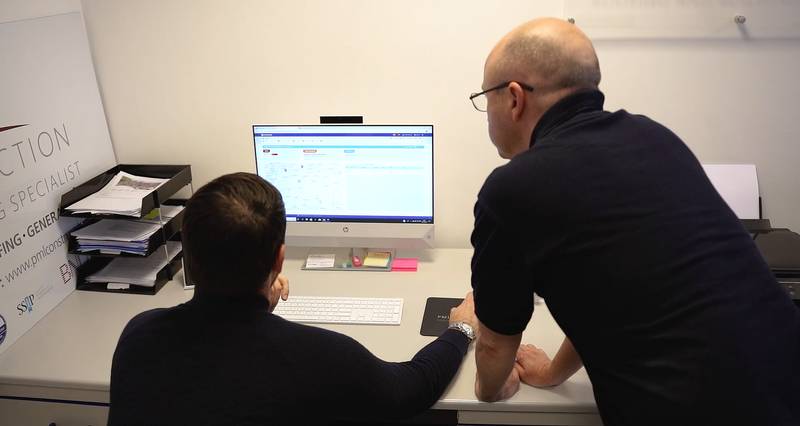If you’re a sales person, you’re probably also a people person. You love to chat, to build and nurture relationships and to engage with people. According to Hubspot, 82% of sales professionals say that building relationships with people is the most important part of selling (and the most enjoyable part of their job).
And that all starts with a great discovery call.
In this blog, we’ll share the best questions to ask on a sales discovery call to ensure the most positive outcome. Our focus here is on B2B sales primarily.
Why is a Sales Discovery Call Crucial?

The sales discovery call is a sliding doors moment. It’s either the start of a fruitful business relationship or a dead end. It’s a vital stage in the sales cycle. And the discovery call questions that you ask your potential customer will determine that.
By asking the right questions, you’ll find your prospect’s pain points and business goals, as well as the challenges they face. This first call will help you understand the buyer’s journey. It’ll give you a good idea whether it’s worth continuing to encourage them along the sales process or walk away.
Four things you want to achieve in your sales discovery call:
- To discover your potential customer has a problem that you can solve. When you hear about their pain point and you have a new solution for it, you’ve struck gold!
- To learn information that you can use later in the sales process. That may be who the key decision-makers are, their buying process or obstacles to overcome to seal the deal.
- To develop a trusted relationship with the potential client. Use this first call to demonstrate credibility, create trust, show expertise and the power of your product/ service, and build rapport between you.
- To find out whether to ‘stick or twist’. Do you stand a chance of winning business with this client? Is it worth a follow up or is it dead in the water? Don’t waste your time if there’s no hope of progress.
Before you make contact with a potential client, you must do your research. This pre-cold call preparation is vital. Learn about their company, their industry, their offering and any synergies between your business and theirs. Check your CRM for any previous interactions between your businesses. Find out more about sales discovery call preparation
Now comes the bit you’ve been waiting for – the right questions to ask during the sales discovery process.
Discovery Questions: Setting the Stage
Gather information on your potential client, their situation and daily work. You may well know this from your research, but it’s good to hear it from them directly to gain greater understanding and awareness.
- Tell me about your function and your day-to-day responsibilities
- Tell me more about your company
- What are your success metrics (KPIs)?
- What do you like about your current process?
Qualifying Questions: Discover Pain Points
Now, dig deeper to find the problems that you can solve for them. Discover your prospect’s needs, the challenges they face, their current processes and what has to improve. These are valuable insights to help you move forward with the potential client.
- What are your current goals?
- What’s your timeline for that?
- Is there a budget available for x?
- What are your key priorities?
- How’s your current solution working?
- What would your best solution look like?
- What have you tried to address that before?
- What would a successful outcome be for you?
Disqualifying Questions: Identify Roadblocks
It’s equally important to find out obstacles, and reasons why they wouldn’t purchase from you. Ask specific questions to work out if they’re a good fit and likely to progress further down the sales funnel with your business. The focus is on budgets, timelines and decision-making processes.
- What are the main roadblocks to reaching that goal?
- What’s your budget for this and who’s the budget owner?
- What’s the biggest challenge you face with x?
- If x happened, what would the business do? How would that impact your team?
Next Step Questions: Establish How To Proceed
Be clear about what’s going to happen next. Ask follow up questions to progress your prospect along the sales pipeline.
- Who else is involved in making this purchase decision? Would other stakeholders need to be included in the process?
- What would make this process easier and how can I help with that?
- Are you considering other vendors?
- What’s your purchasing process?
- How will this solution make your day-to-day easier?
- What do we need to do to make this deal happen?
- Based on what we’ve discussed today, I’d recommend…
At the end of the conversation, it’s good to leave them with a recommendation. Recap on what you’ve discussed and suggest a good time for a follow up call. Perhaps they’d like a product demo or further pricing information sent over. Provide whatever they need to move along the sales pipeline.
Discovery Call Tips
Don’t wing it. A successful sales call involves work – before, during and after the conversation.
Be prepared – write your questions, do extensive research (not just a browse of their LinkedIn profile) and try to work out how your product or service can help them. Feel free to use the questions listed above as a template for your call
Active listening – truly engaging with your prospect to understand them and uncover those valuable nuggets of information is transformative. When you really get them, their pain points and needs, you can craft the perfect sales pitch and move closer to the closing deal stage
Ask open-ended questions – encourage your prospect to open up and spill the beans on their company. Let them share valuable insights like challenges, pain points and needs
Use clear communication – make sure you understand your prospect’s point of view before moving on. Ask ‘why’ to gain more clarity and valuable insights.
Want to make better sales discovery calls and improve your sales process?

If you want to close deals effectively, you need to start with a great discovery call. Asking the right questions is key to your sales team getting the relevant information to qualify your prospects.
Even if you have the best product or service in the world with the most competitive pricing, you won’t connect with your potential customer if you don’t ask the right questions. Understanding your prospect’s needs, pain points and challenges is a vital part of the sales process.
Phil Chantry, Business Coach, can help you to improve your sales process. Get in touch to find out how we can work together and boost your sales.
“The session involved a detailed review of our sales and margins, and we received much needed guidance for our next three months. Together with Phil’s brilliant workshop programs, we now have the right tools to help run the business more efficiently and to help overcome some of the most common small business challenges.” Sam Keehn, Quaddus Creative.




